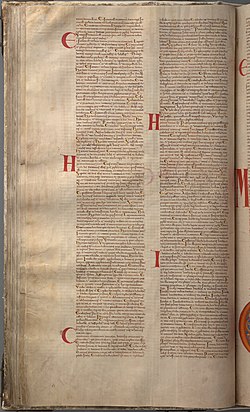
Isaiah 14 is the fourteenth chapter of the Book of Isaiah in the Hebrew Bible or the Old Testament of the Christian Bible. This book contains the prophecies attributed to the prophet Isaiah, and is one of the Books of the Prophets.
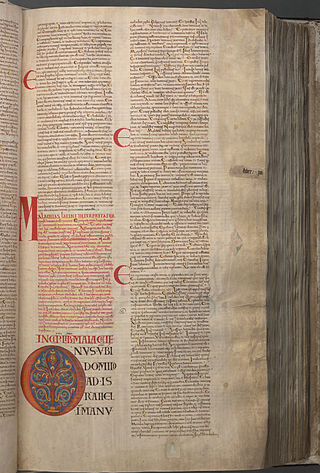
Zechariah 14 is the fourteenth chapter in the Book of Zechariah in the Hebrew Bible and the Old Testament of the Christian Bible. This book contains the prophecies attributed to the prophet Zechariah, and is a part of the Book of the Twelve Minor Prophets. This chapter is a part of a section consisting of Zechariah 9–14. It continues the theme of chapters 12 and 13 about the 'war preceding peace for Jerusalem in the eschatological future'. It is written almost entirely in third-person prophetic discourse, with seven times references to the phrase 'that day'.

Zechariah 4 is the fourth of the 14 chapters in the Book of Zechariah in the Hebrew Bible or the Old Testament of the Christian Bible. This book contains the prophecies attributed to the prophet Zechariah. In the Hebrew Bible it forms part of the Book of the Twelve Minor Prophets. This chapter relates Zechariah's fifth vision. It is a part of a section consisting of Zechariah 1–8.

Zechariah 3 is the third of the 14 chapters in the Book of Zechariah in the Hebrew Bible or the Old Testament of the Christian Bible. This book contains the prophecies attributed to the prophet Zechariah. In the Hebrew Bible it forms part of the Book of the Twelve Minor Prophets. This chapter records a vision of Joshua, the high priest, being cleansed before God. It is a part of a section consisting of Zechariah 1–8.
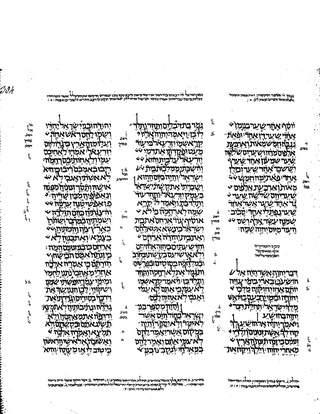
Zechariah 2 is the second of the 14 chapters in the Book of Zechariah in the Hebrew Bible or the Old Testament of the Christian Bible. This book contains the prophecies attributed to the prophet Zechariah. In the Hebrew Bible it forms part of the Book of the Twelve Minor Prophets. This chapter is a part of a section consisting of Zechariah 1–8. It records the third of eight visions received by the prophet, followed by an oracle calling the exiles to return to the city where Yahweh is about to dwell and all nations will come.

Zechariah 6 is the sixth of the 14 chapters in the Book of Zechariah in the Hebrew Bible or the Old Testament of the Christian Bible. This book contains the prophecies attributed to the prophet Zechariah. In the Hebrew Bible it is part of the Book of the Twelve Minor Prophets. This chapter contains a description of Zechariah's eighth and final vision, and the crowning of Joshua the High Priest. It is a part of a section consisting of Zechariah 1–8.
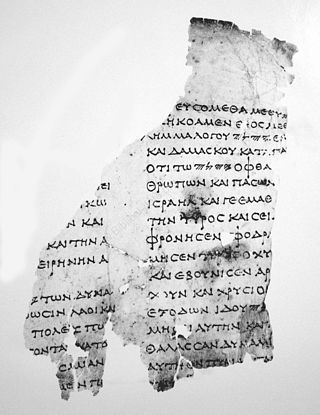
Zechariah 8 is the eighth of the 14 chapters in the Book of Zechariah in the Hebrew Bible or the Old Testament of the Christian Bible. This book contains the prophecies attributed to the prophet Zechariah. In the Hebrew Bible it is part of the Book of the Twelve Minor Prophets. This chapter concludes the so-called "First Zechariah", consisting of Zechariah 1–8, and brings together ten "short independent oracles", each referring to the word of "the Lord of Hosts".
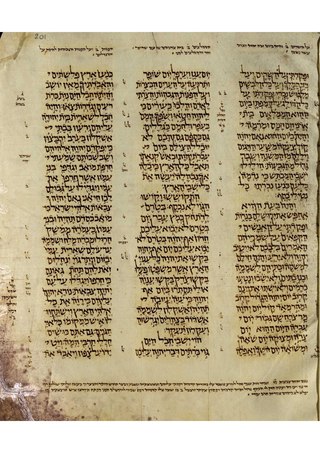
Zechariah 9 is the ninth of the 14 chapters in the Book of Zechariah in the Hebrew Bible or the Old Testament of the Christian Bible. This book contains the prophecies attributed to the prophet Zechariah. In the Hebrew Bible it is part of the Book of the Twelve Minor Prophets. This chapter opens the so-called "Second Zechariah" portion, consisting of Zechariah 9–14, which was composed "long after the previous portions of the book". It concerns the advance of an enemy, but God defends Jerusalem and promises that his king will triumphantly enter the city to bring peace among all nations. This chapter also contains a continuation of the subject in the seventh chapter. The oracle referring to the king's entry into Jerusalem is quoted in the New Testament in the accounts of Jesus' triumphal entry into Jerusalem.
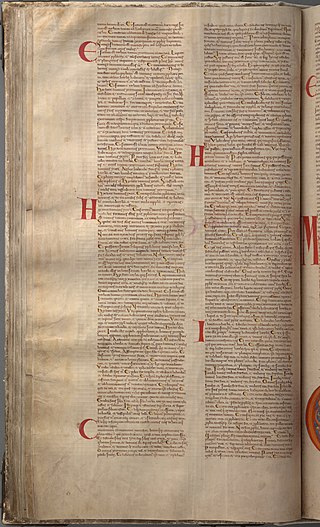
Zechariah 10 is the tenth of the 14 chapters in the Book of Zechariah in the Hebrew Bible or the Old Testament of the Christian Bible. This book contains the prophecies attributed to the prophet Zechariah. In the Hebrew Bible it is part of the Book of the Twelve Minor Prophets. This chapter is a part of a section consisting of Zechariah 9–14, attributed to the so-called "Second Zechariah", an anonymous successor to the Zechariah of chapters 1-8.

Zechariah 11 is the eleventh of the 14 chapters in the Book of Zechariah in the Hebrew Bible or the Old Testament of the Christian Bible. This book contains the prophecies attributed to the prophet Zechariah. In the Hebrew Bible it is part of the Book of the Twelve Minor Prophets. This chapter is a part of a section consisting of Zechariah 9–14, attributed to the so-called "Second Zechariah", an anonymous successor to the Zechariah of chapters 1-8.

Zechariah 13 is the thirteenth of the 14 chapters in the Book of Zechariah in the Hebrew Bible or the Old Testament of the Christian Bible. This book contains the prophecies attributed to the prophet Zechariah, and is a part of the Book of the Twelve Minor Prophets. This chapter is a part of a section consisting of Zechariah 9–14. Verses 1–6 may be a part of a section together with 12:1-14, whereas verses 7–9 is a separate part, forming a three-section "entity" with 14:1-21.

Jeremiah 29 is the twenty-ninth chapter of the Book of Jeremiah in the Hebrew Bible or the Old Testament of the Christian Bible. It is numbered as Jeremiah 36 in the Septuagint. This book compiles prophecies attributed to the prophet Jeremiah, and is one of the Books of the Prophets. This chapter records several "letters reported by the third-person narrator": from Jerusalem, Jeremiah sent a letter to the people in the Babylonia exile and he responded to a letter about him from Shemaiah.

Ezekiel 3 is the third chapter of the Book of Ezekiel in the Hebrew Bible or the Old Testament of the Christian Bible. This book contains the prophecies attributed to the prophet/priest Ezekiel, and is one of the Books of the Prophets. This chapter contains the call to Ezekiel to speak to the people of Israel and to act as a sentry for them.

Ezekiel 24 is the twenty-fourth chapter of the Book of Ezekiel in the Hebrew Bible or the Old Testament of the Christian Bible. This book is attributed to the prophet/priest Ezekiel, and is one of the Books of the Prophets. This chapter contains Ezekiel's "last oracle against Jerusalem".

Jeremiah 14 is the fourteenth chapter of the Book of Jeremiah in the Hebrew Bible or the Old Testament of the Christian Bible. This book contains prophecies attributed to the prophet Jeremiah, and is one of the Books of the Prophets.

Jeremiah 16 is the sixteenth chapter of the Book of Jeremiah in the Hebrew Bible or the Old Testament of the Christian Bible. This book contains prophecies attributed to the prophet Jeremiah, and is one of the Books of the Prophets. In the first part of this chapter, Jeremiah is instructed to adopt a lifestyle which will serve as a "symbolic enactment of God's word", comparable to the instructions given to other prophets: see Hosea 1:2–9, Isaiah 8:3–4 and Ezekiel 24:15–24.

Jeremiah 33 is the thirty-third chapter of the Book of Jeremiah in the Hebrew Bible or the Old Testament of the Christian Bible. It is numbered as Jeremiah 40 in the Septuagint. This book contains prophecies attributed to the prophet Jeremiah, and is one of the Books of the Prophets.

Jeremiah 32 is the thirty-second chapter of the Book of Jeremiah in the Hebrew Bible or the Old Testament of the Christian Bible. It is numbered as Jeremiah 39 in the Septuagint. This book contains prophecies attributed to the prophet Jeremiah, and is one of the Books of the Prophets. In this chapter, Jeremiah redeems a piece of property belonging to his family and explains the significance of his act.

Jeremiah 25 is the twenty-fifth chapter of the Book of Jeremiah in the Hebrew Bible or the Old Testament of the Christian Bible. This book contains prophecies attributed to the prophet Jeremiah, and is one of the Books of the Prophets. Chapter 25 is the final chapter in the first section of the Book of Jeremiah, which deals with the earliest and main core of Jeremiah's message. In this chapter, Jeremiah identified the length of the time of exile as seventy years.

Jeremiah 43 is the forty-third chapter of the Book of Jeremiah in the Hebrew Bible or the Old Testament of the Christian Bible. This book contains prophecies attributed to the prophet Jeremiah, and is one of the Books of the Prophets. This chapter is part of a narrative section consisting of chapters 37 to 44. Chapters 42-44 describe the emigration to Egypt involving the remnant who remained in Judah after much of the population was exiled to Babylon. In this chapter, Jeremiah performs in Egypt one of the sign-acts distinctive of his prophetic style.
